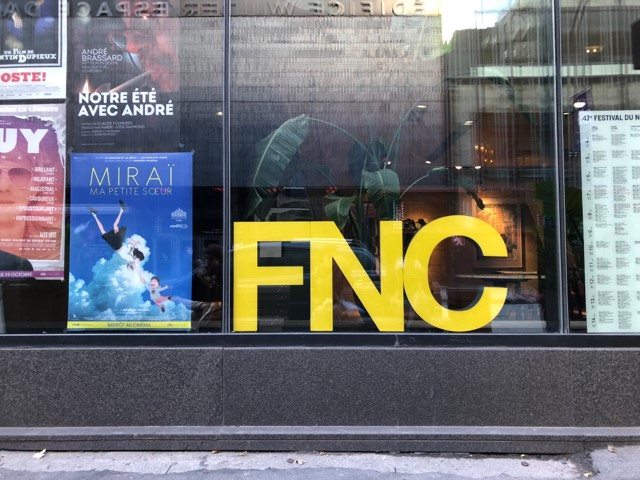I won’t mince words: Hirokazu Kore-eda’s new film, the Palme D’or winner Shoplifters, is a complete and utter masterpiece. Kore-eda’s camera shacks up with the Shibata family, a patchwork Tokyo household on the brink of poverty, scraping by because everyone does what little work they can. For young Shota, that means shoplifting, just like his stepfather taught him. On the way home from a shopping spree, they find a four year old girl named Yuri, abused and neglected by her birth parents, and after they take her home for a hot meal, they simply decide, well… not to bring her back. Their household is warm and welcoming, cobbled together out of stray, unofficial bits, with the lurking dread that any passing draft could knock it down.
Kore-eda, of course, is barrelling toward a tear jerking conclusion that you will not be prepared for. But on the way there, his camera delicately explores and reveals all the nooks and crannies of not just the physical space of the house, but of these people’s lives. Everything radiates tenderness and truth: from the grandma’s gambling to the young daughter Aki’s job as a peep-show performer, from the badly-suffering sex life of the parents to the struggle of young Shota to carve out his identity, to Yuri learning what true familial love looks like. It’s so staggeringly, achingly good, that its smallest gestures and glances can bring you to your knees. This is simply the work of a master filmmaker doing what he does better than anyone else, doing it better than he ever has before. See this film like your life depends on it.
It’s so staggeringly, achingly good, that its smallest gestures and glances can bring you to your knees.
Coming of age films don’t come more abstract than Genese, a film by Quebec auteur Philippe Lesage. This follow up to his fantastic first film The Demons (and towards the end, we discover, a sort of sequel…) follows two siblings in Cegep: Charlotte (Noee Abita), who is excited to try out the adult world of romance after breaking up with her doofus boyfriend, and Guillaume (Theodore Pellerin), who is terrified by the possibility that he might have romantic feelings for his best friend. It sounds like an ordinary high school melodrama but it doesn’t play like one: it’s filled with lingering long-shots that drift across grouped-up bodies, montage that cuts out connective tissue, and idiosyncratic music that could fool you into thinking you’re watching a period piece (extra points for the liberal use of Outside, a stone cold Montreal indie classic). Lesage’s decoupage is enrapturing and strangely intense.
Of the film’s many pleasures, the greatest is watching the emergence of Theodore Pellerin, a terrific young actor who uses every inch of his body to communicate his lanky, awkward standing with his peers, and with his own identity. But the cutting ease with which he delivers his zingers, comebacks, and eventually (in what may be the best single scene of the entire fest) heartfelt confessions, displays both the actor’s tenderness and inner fire. This film is shocking in the best possible way: despite its distant exterior, you’re shocked how deep it cuts.
Speaking of deep cuts, Knife + Heart is an honest to god modern Giallo picture: a slasher mystery set in 1979 Paris about gay porn director Anne Pareze, who must hunt down a villainous killer after her actors, armed with a switchblade inside a dildo. What follows is an odyssey of neon and blood, dark Parisian alleyways, strange supernatural birds, and even better fake porn scenes than the ones found in Boogie Nights (the fake film’s title: HOMOcide). The story goes on unsuccessful tangents and the characters never rise above archetypes, but that’s no real issue: a film like this is only a failure if it’s not good looking. Fortunately, this movie is top-to-bottom gorgeous, coloured to perfection and edited to the beat of its pulse pounding soundtrack; the touches of black and white inverted flashback photography are inexplicably affecting. What the film offers is nothing less than pure giallo pleasure.
Lav Diaz described his new film, Season of the Devil, as a “rock opera”, but don’t let that entice you, it’s still a Lav Diaz picture. Meaning, of course, that it’s four hours long (among the shortest in his filmography!), that the camera barely moves, that the story depends on specific knowledge regarding the colonial history of the Philippines (in this case, the Civilian Home Defence Force), and that there is no score. That’s right, it’s an acapella opera. The film is at its most productive and enticing during its overt bouts of surrealism, mostly regarding the two-faced military chief on the poster, and fortunately, all these shots are filled with stunning decor and dazzling pools of light (the film is shot in black and white – sure Diaz, why not remove another element while you’re at it!) To be completely honest, Diaz’s films stand up very strongly to analysis, but review is useless: you either (somehow) like this guy’s style or, like me, you find yourself eventually hitting a brick wall and asking yourself “why are all these shots so goddamn long?” – not an especially productive question, but the most pressing one.
I don’t think I’ve ever seen a film with a structure like Bi Gan’s Long Day’s Journey into Night: the first half plays like a measured, moody noir, with long, expertly composed shots, pools of coloured light and perilous darkness, and a narrative so elusive it borders on dream logic. That is, until our drifting detective protagonist, Luo (Huang Jue), walks into a movie theatre, falls asleep, and what follows is a 55 minute dream sequence reflecting on the incomplete story, shot in 3D, and taking place entirely in one take.
Is this a mere (deeply respectable) stunt, or is Bi Gan up to something more? The first half is built out of rock-steady, somehow distant close-ups, and the second is all handheld, behind-the-back immediacy. Part one renders domestic spaces in hazy hues, while part two travels through coal mines, ziplines, and dank cellars so vivid you can almost reach out and grab them. Much of the story details Luo’s quest to find a woman named Wan Qiwen, played by veteran actress Tang Wei (who worked with Ang Lee in Lust, Caution and Michael Mann in Blackhat). She appears once in his memory and once in his dream, in a different persona. Which is the true Wan Qiwen, if there is one? Beats me. All I can tell you is that this is the film from FNC that I’ve spent the most time thinking about since it ended.
Don’t be fooled by the autumn-hued Davies-esque lensing, the elliptical montage, or the social realist subject matter, Ray & Liz, deep down, is a gross out comedy caked with refuse and brimming with flies. This is a semi-autobiographical portrait of director Richard Billingham’s do-nothing alcoholic father Ray and his tattoed, bad-tempered mother Liz; it is staggering the amount of inauthenticity Billingham can inject into this true story. Thirty minutes in I thought of walking out, but soon decided I had to stay, just to see how mean and tasteless it could get. I was rewarded with an ending straining for sympathetic sadness, suggesting that actually, I was supposed to be deeply moved by the scene where a drunken, overweight, mentally disabled man throws up in his sleep from being force fed alcohol, and the dog walks in frame to lick up the vomit. This film is trash.
The silhouettes in An Elephant Sitting Still are the least romantic in cinematic history: the characters appear shrouded in shadow, their features removed, placed before a window, a balcony, or an overcast sky that registers as pure white light. The film returns to this image again and again throughout its monumental four hour runtime, and the point becomes clear: the world is blank, and these poor people are filled with nothing but darkness.
The film tracks four characters in a depressed, northern Chinese town over the course of a single terrible, horrible, no good very bad day: Bu Wei, a drifting student who finds himself deep trouble after accidentally pushing a teenage gangster down the stairs; Yu Cheng, the heartless brother of the gangster who comes for Bu; Huang Ling, a girl Bu knows from school, who struggles to cope with her life with her mother; and Wang Jin, a pensioner who feels himself being forced into a nursing home. After bobbing and weaving into each other’s lives, these characters eventually unite in their desire to take the train to Manzhouli and see the titular elephant, to find any sort of escape from the “wasteland” they inhabit, no matter how symbolic or static.
This depression epic is crafted from very long handheld shots, following the characters closely and unwaveringly. Despite its epic length, indeed because of it, it’s frighteningly watchable, and its drab wasteland world becomes incredibly absorbing. This is the first feature from filmmaker Hu Bo, and his voice is staggering and unparalleled. Tragically, Bo committed suicide shortly after the film was finished, making this his last film as well. An Elephant Sitting Still is unbelievably, almost feverishly sad, but it is also monumentally human, and completely singular. Hu Bo gave us so much, but he had so much more to give.
Capernaum by Nadine Labaki – Jenna Benchetrit
A harrowing tale of survival set in Lebanon, Capernaum tells the gripping story of nine-year-old Zain, who lives in destitution with his abusive parents and many siblings. The film opens with Zain opposite his mother and father in court, suing them for giving him life; it’s a captivating start, but only a mere building block for what’s to come.
The film has impressive scope and a neo-realist edge, particularly due to its cast of first time actors. Lead performer Zain Al Rafeea gives a performance so crushing and raw, conveying a weariness beyond his years as he wanders the streets, hustling to survive, cursing anyone who dares get in his way. It’s haunting to watch a child so worn down by anger, and this is made all the more heartbreaking when Rafeea subtly reminds us of his youth in crucial moments. It’s likely the best onscreen child performance I’ve seen yet.
Capernaum is not for the faint of heart; it’s an extremely heavy two and a half hours, but it reveals truths about destitution and desperation that ought to be seen by as many people as possible. The film asks its audience to consider the sociopolitical realities of poverty, but it does so through the lens of a child — one grappling with the moral dilemmas that his circumstances have burdened him with, and that, as he clearly feels, his parents have burdened him with.
This is part 2 of the FNC review. For part 1, click here.








